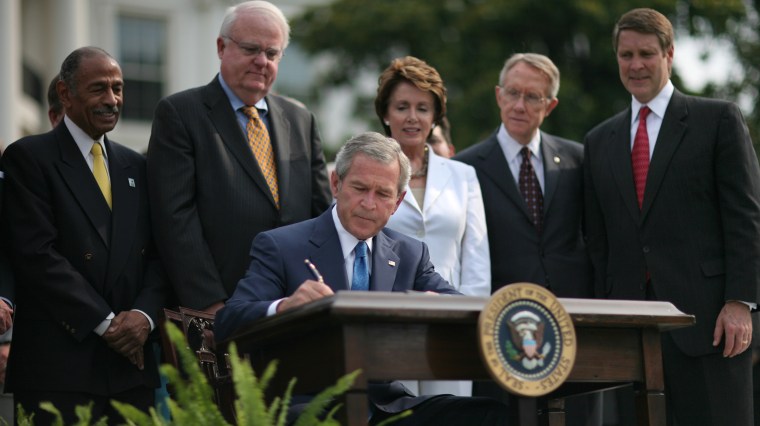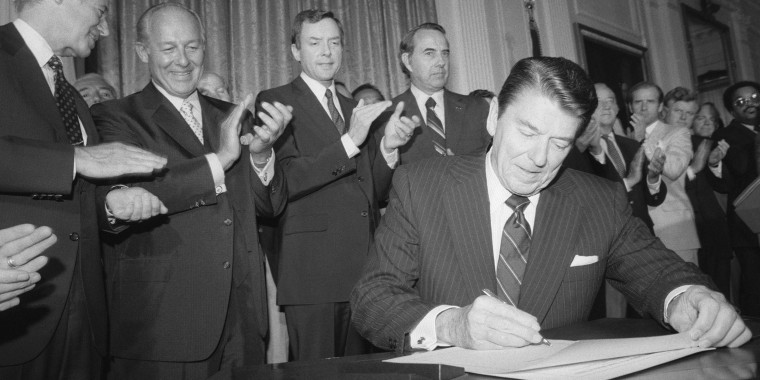In his Tuesday address on voting rights, President Joe Biden made an “appeal to my Republican colleagues, to those Republicans who believe in the rule of law: Restore the bipartisan tradition of voting rights.”
While there is a “bipartisan tradition” of supporting voting rights measures, the history isn’t as straightforward as Biden suggested.
While there is a “bipartisan tradition” of supporting voting rights measures in the modern era, the history isn’t as straightforward as Biden suggested.
To be sure, the landmark Voting Rights Act of 1965 was created with strong support from both parties. In the House, Democrats voted for the final bill by a margin of 217-54 and Republicans by a margin of 111-20; in the Senate, Democrats backed it 49-17 and Republicans 30-1.
Passage of the law, however, was simply the start. Because some of its special provisions were established as temporary measures, the Voting Rights Act was brought up for reauthorization and expansion over the next half century — in 1970, 1975, 1982, 1992 and, most recently, 2006. At every point in this process, Biden noted, the law could count on backing from his Republican predecessors in the White House: “Richard Nixon, Gerald Ford, Ronald Reagan, George H.W. Bush, George W. Bush. They all supported the Voting Rights Act.”
It wasn’t simply Republican presidents who supported the renewal of the Voting Rights Act, Biden noted. Republicans in Congress, like their Democratic colleagues, overwhelmingly embraced the measures, too.
“In 2006,” Biden stressed, “the Voting Rights Act passed 390 to 33 in the House of Representatives and 98 to 0 in the Senate.”
Biden marveled that even Strom Thurmond, the ardent segregationist who ran for president on the Dixiecrat ticket in 1948 and left the Democratic Party in 1964 over its support for civil rights, finally came around to vote for the law. (“Wow,” said a member of the Atlanta audience. “You can say that again,” the president ad-libbed. “Wow.”)
On the surface, at least, the history seems clear: The Voting Rights Act was crafted with bipartisan backing and, over time, found ever greater support from Republicans and Democrats alike.
But the real history, as always, is a bit muddier.
For other Republicans, support for voting rights has come more from a cynical belief that it would benefit them politically.
For some Republicans, support for voting rights has been a solid stance grounded in principle. Even as their numbers were beginning to thin in the 1960s and 1970s, liberal and moderate Republicans provided crucial support for the original passage of the law and remained vocal supporters of voting rights protections in the years that followed. Congressional leaders such as Illinois Sen. Everett Dirksen and Pennsylvania Sen. Hugh Scott did considerable work getting the legislation passed and renewed, while prominent Republicans outside Congress — including Michigan Gov. George Romney, a major presidential contender — provided significant public support.
But even some of the conservatives who pushed the Republican Party to the right remained forthright supporters of voting rights. Illinois Rep. Henry Hyde, a social conservative whose fight against abortion made him a hero in pro-life circles, provided crucial backing for the reauthorization of the Voting Rights Act in the Reagan era. Likewise, Rep. Jim Sensenbrenner of Wisconsin, another Republican who combined a conservative record and a strong commitment to voting rights, proved pivotal in securing the 25-year reauthorization of the act in 2006.
Such figures, however, have increasingly been exceptions in Republican circles, rather than the rule. For other Republicans — including the presidents Biden praised — support for voting rights has come less from a sincere belief in the rightness of the cause and more from a cynical belief that it would benefit them politically.
When the Voting Rights Act came up for its original reauthorization in 1970, for instance, the Nixon administration was torn on how to handle it. Nixon had rolled back his earlier support for civil rights legislation during his 1968 campaign. As president, he insisted no new measures were needed because, as he put it in his inaugural address, “the laws have caught up with our conscience.”
When Congress proceeded to reauthorize the Voting Rights Act anyway — extending the right to vote to 18-year-olds along the way — many of Nixon’s aides urged him to veto the law because they believed a surge in African American voters would only help Democrats and hurt Republicans. “A veto,” Nixon’s assistant for legislative affairs urged, “would help solidify your support in Dixie.”
This internal debate in Republican circles — between cynical supporters and cynical opponents — stretched on for decades.
Such self-interest from opponents of voting rights might be expected, but nominal supporters could be just as cynical. Kevin Phillips, the Nixon campaign strategist whose 1969 book "The Emerging Republican Majority" presciently predicted a new conservative era, argued that the GOP should embrace the law, precisely because it meant more African Americans would vote Democratic.
“The more Negroes who register as Democrats in the South, the sooner the Negrophobe whites will quit the Democrats and become Republicans,” he told The New York Times Magazine in 1970. “That’s where the votes are.”
Ultimately, events forced Nixon’s hand. After National Guard members and police killed a half-dozen college students at Kent State University and Jackson State College that spring, sparking a massive wave of campus protests, Nixon worried that vetoing voting rights legislation might make that “volatile situation” even worse. In the end, he grudgingly signed the Voting Rights Act reauthorization, but just to prevent the “goddamn country” from “blowing up.”
This internal debate in Republican circles — between cynical supporters and cynical opponents — stretched on for decades.
For their part, conservative activists outside the government remained blunt in their opinion that voting rights harmed the conservative agenda. Paul Weyrich, a key architect of the New Right and a co-founder of the Heritage Foundation, put it bluntly in 1980 when he told a rally of religious conservatives: “I don't want everybody to vote. Elections are not won by a majority of people. They never have been from the beginning of our country, and they are not now. As a matter of fact, our leverage in the elections quite candidly goes up as the voting populace goes down.”
Despite such advice from conservative strategists, the Voting Rights Act had by the 1980s been enshrined in a patriotic pantheon. As civil rights activist Ralph Neas noted, it had quickly secured a spot alongside “motherhood, apple pie, the Constitution and baseball.” Most politicians — who now faced truly multiracial electorates — treated voting rights as sacrosanct.
Accordingly, the 1982 reauthorization sailed through Congress fairly easily. North Carolina Republican Sen. Jesse Helms waged a lonely filibuster, but even longtime opponents of voting rights such as Strom Thurmond refused to go along. In the end, the reauthorization passed by stunning margins: 389-24 in the House and 85-8 in the Senate. Reagan hailed the Senate’s support as a “statesmanlike decision.” He vowed to sign it quickly, and he did.
Sen. Jesse Helms waged a lonely filibuster, but even longtime opponents of voting rights such as Strom Thurmond refused to go along.
As the Republican president approved the law, however, some in his administration sought to undermine it. William Bradford Reynolds, Reagan’s assistant attorney general for civil rights, asserted that the landmark laws of the 1960s amounted to “government-imposed discrimination” that had set up a “kind of racial spoils system” in the ensuing years. The extension of the Voting Rights Act, he stated in his Senate testimony, threatened to establish “quotas in the electoral process.”
Younger Republicans in the Justice Department took their cues here from Reynolds, not Reagan. Their ranks included a number of rising stars in the conservative legal movement, including future Chief Justice John Roberts. (A litigator in the Civil Rights Division’s voting unit called Roberts a “zealot” who had “fundamental suspicions when it came to the Voting Rights Act’s utility.”)
This pattern, in which Republican politicians proudly supported renewals and expansions of the Voting Rights Act even as Republican officials worked to end it, came to a head in the 21st century.
The 2006 reauthorization of the Voting Rights Act — whose overwhelming Republican support has been invoked by Biden and others this week — seemed on the surface to show the “bipartisan tradition” of support for voting rights was stronger than ever. After the resounding show of support for the act, President George W. Bush held a grand signing ceremony on the White House lawn. With legislators and civil rights leaders arrayed around him, Bush asserted that “Congress has reaffirmed its belief that all men are created equal.”
But some of the support for the reauthorization was insincere. As Amanda Becker astutely noted in Congressional Quarterly, several of the lawmakers gathered around Bush at the bill signing had, just the day before, signed on to a report that challenged the means and ends of the Voting Rights Act, warning it represented a “tool for political and racial gerrymandering.” The report, largely ignored at the time, set off alarm bells for voting rights experts. “It was clear,” law professor Rick Hasen told Becker, “that the seeds were being sown for a legal challenge.”
That challenge, of course, came seven years later, in the landmark ruling of Shelby County v. Holder. With that decision, the conservative majority on the court — led by Roberts, a Bush appointee — gutted key sections of the Voting Rights Act.

In response, Republicans who truly supported voting rights called for a new law to shore up our democratic institutions but also to confirm our democratic principles.
“The Voting Rights Act is not only about ending discrimination at the polls,” Sensenbrenner urged in 2017. “It also gives faith to the voters who need to know that their vote counts and the election process is fair.”
Such pleas for new voting rights protection have, of course, been ignored. Republican politicians, who long feared the political costs of a vote against voting rights, now benefit from the political cover that conservatives like Roberts spent a career providing.
The “bipartisan tradition” backing voting rights is, in many ways, a mirage. The liberal and moderate Republicans who helped create the Voting Rights Act are long gone, as are the prominent conservatives who saw no conflict between their ideology and democracy and who were confident their party could win elections even if everyone voted. What remains in the Republican ranks is a core that sees voting rights as a clear and present danger to the party.
Republicans have stopped pretending to care about voting rights. It’s time, too, that Democrats stopped pretending most Republicans ever cared.

